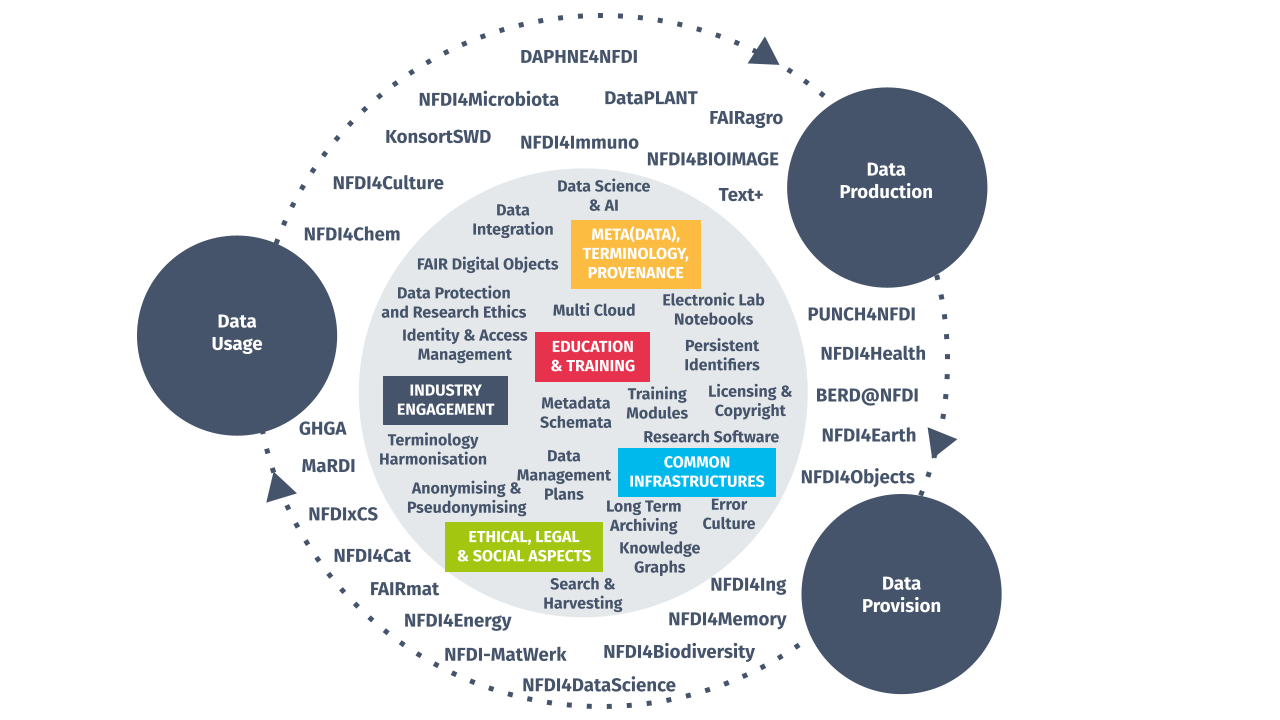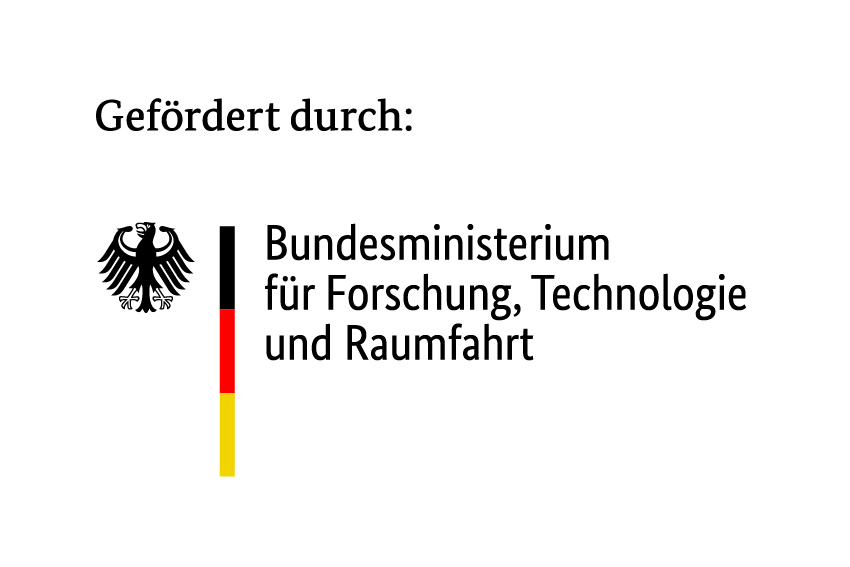About us
Data as a common good for excellent research, organised by the scientific community in Germany. This is the vision of the German National Research Data Infrastructure (NFDI).
NFDI systematically indexes and networks valuable scientific and research data for the entire German scientific system and makes it available for sustainable and qualitative use. Until now, they have mostly been available on a decentralised, project-related or temporary basis.
Effective research data management strengthens the exchange between different disciplines and Germany as a centre of science and research. It enables the systematic handling of big data and the use of artificial intelligence. It also simplifies the responsible sharing of data between science and industry or at an international level.
NFDI is intended to create a permanent digital knowledge repository as an indispensable prerequisite for new research questions, findings and innovations.
Relevant data should be made available in accordance with the FAIR principles (Findable, Accessible, Interoperable and Reusable).
Contributors
Member organisations
Sections
Vision
Vision and mission
Vision
NFDI: Data as a common good for excellent research, organised by the scientific community in Germany.
Mission
Step by step, we are improving the possibilities for using data for science and society. Through our cooperation in the NFDI Association, an umbrella organisation for research data management in all branches of science is being created. In cooperation with national and international partners, we are creating the framework conditions for legally compliant, interoperable and sustainable data infrastructures that are easily accessible for researchers in their everyday work. We educate people, strengthen their competence in dealing with data and open up new career paths.
Strategy
Improving the environment for collaboration
To develop NFDI into a cross–consortia infrastructure, we need the active participation of all members and consortia. Therefore, we are making the work within the sections more effective and the section structure more sustainable to achieve binding, shared results. For this purpose, we are establishing a
simple, transparent target and work organisation within the sections and connecting them better with the Scientific Senate.
Increase the use of consortia and basic services
We are creating an overarching service portfolio intending to strategically guide the further development of consortia and basic services and increase the utilisation of services in science.
Consortia can propose services. We define criteria that enable the Scientific Senate to decide on the inclusion and removal of services for the overarching service portfolio.
Enabling comprehensive implementation of the FAIR principles
We create a portfolio of metadata standards and thus lay the foundation for a comprehensive implementation of the FAIR principles in the consortia. For this purpose, we develop criteria for deciding which metadata standards are mandatory or optional to be applied in the NFDI. We negotiate related processes to optimise interoperability in the establishment, further development, and international coordination of standards. We ensure a cross–consortia metadata standard to improve the accessibility of research data in researchers’ day–to–day work.
Expanding international cooperation
International cooperation between association members and consortia is the indispensable basis for shaping international developments, especially in European data spaces. They are an important element for optimising connectivity and the development of structures. We are coordinating the development of a national node in the European Open Science Cloud (EOSC), which ensures cooperation and concrete data exchange in the European Research Area. We are developing a “NFDI–EOSC Vision 2028” for the participation of NFDI in EOSC.
Strengthen competence in handling data
Increasing the data literacy of scientists is an important prerequisite for the effective use of services and metadata standards. Consortia and sections create professionally suitable, qualitative, and attractive educational offers that are visible, open, and FAIR. NFDI complements this with educational offers from third parties that meet the criteria mentioned here.
Ensuring sustainability trough operating models
Operating models and suitable governance structures are prerequisites for operating long–term and reliable services. We are drafting an “NFDIVision 2029” on this topic, which will serve as a basis for negotiations with stakeholders. The target vision provides guidance on the critical issues of financing, liability, and coordination.
Courtesy Translation of the, on November 7, 2024, by the Scientific Senate approved German Version
The association Nationale Forschungsdateninfrastruktur (NFDI) e.V.
The non-profit association Nationale Forschungsdateninfrastruktur (NFDI) e.V., based in Karlsruhe, was founded in October 2020 to coordinate the activities involved in setting up the NFDI. More than 300 institutions are now members of NFDI. Science organisations, universities and colleges, non-university research institutions, learned societies and associations are all involved. The federal government and all 16 federal states jointly support NFDI and are also the founding members of the association. The organisation of the association is governed by its statutes.
‘The purpose of the association is to promote science and research through a national research data infrastructure that establishes and develops comprehensive research data management in Germany and increases the efficiency of the entire German science system.’
In particular, organisations that are involved in an NFDI consortium can apply for membership of the association. Other legal entities that are expected to make a significant contribution to the realisation of the association’s purpose can also be accepted as members. Membership of the association is free of charge.
Organisational structure
The association’s board of directors consists of Prof Dr York Sure-Vetter and an administrative director (n.n.). The directorate is supported by the staff of the NFDI office in Karlsruhe.
In addition to the Directorate, the organisation has four other bodies: the Consortium Assembly, the Board of Trustees, the General Assembly and the Scientific Senate. Click the button below to find out more about the function and composition of the bodies.
Parts of NFDI – How we work

The 26 consortia are shown in the outer circle. The five sections are highlighted in colour inside. Graphic: Base4NFDI
Consortia
The individual departments are involved in NFDI in consortia. Several institutions are networked in each of these consortia. All primary research areas (according to the German Research Foundation, DFG) are covered. The consortia were selected in a science-led process under the supervision of the DFG.
Sections
We work on common cross-cutting topics in so-called sections, which are organised as departments of the association. Different disciplines come together in the sections. This should guarantee the compatibility of solutions and the avoidance of parallel developments.
Base4NFDI
As a network of all consortia, Base4NFDI integrates and creates basic services as joint, interoperable solutions. Existing services are adapted or expanded so that they can also be used by researchers from other disciplines. A basic service includes
- Storage and computing services
- Software, processes and workflows
- Personnel support for various service desks
Each proposal for a basic service must result from a collaborative process within a section. The consortium meeting votes on the promotion of a basic service.


